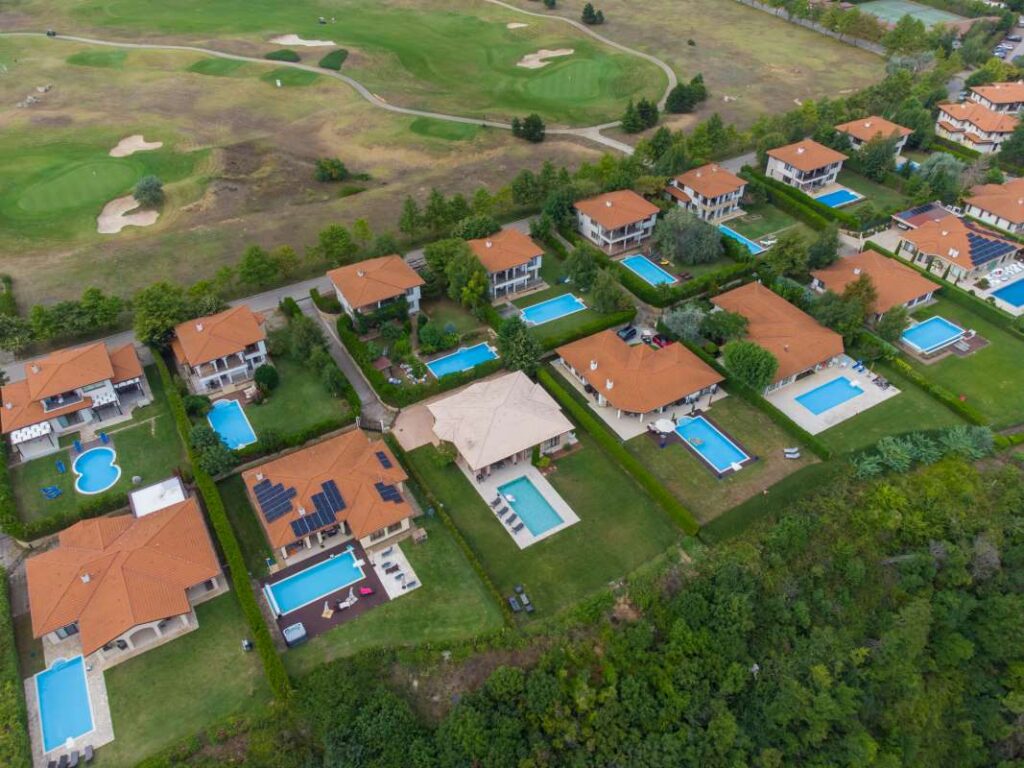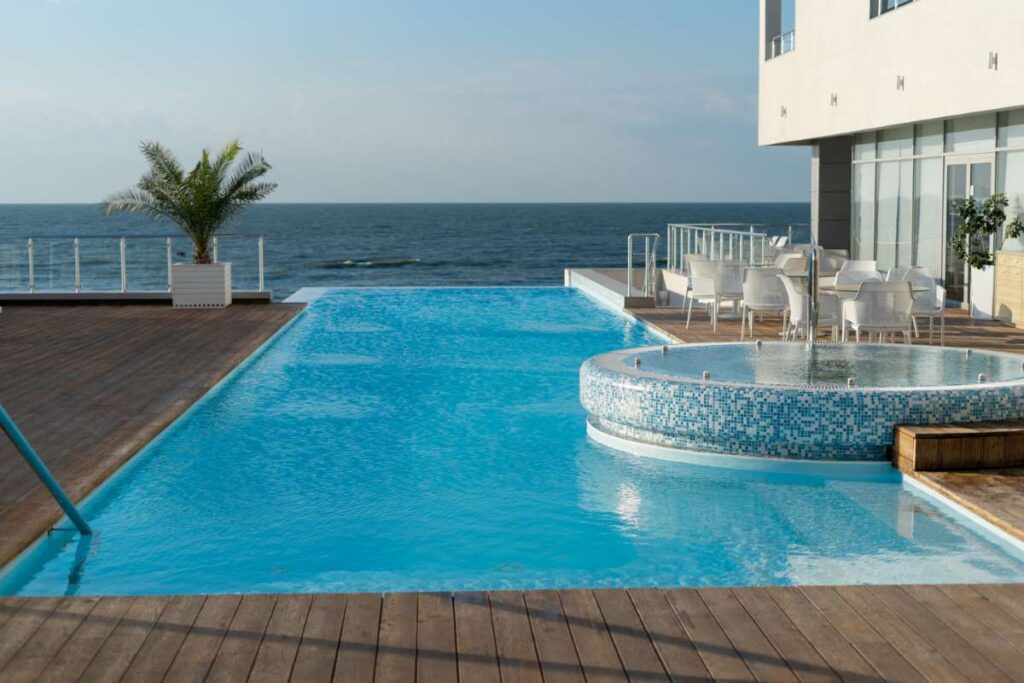Natural Pool Clarifiers vs. Synthetic Chemicals: Educating Clients for Healthier Pools
Explore the differences between natural pool clarifiers and synthetic chemicals, and learn how to make informed choices for your pool maintenance.
In the world of pool maintenance, ensuring crystal clear water while maintaining safety and environmental standards can be a challenge. The debate between using natural pool clarifiers and synthetic chemicals is an ongoing one. This blog post will delve into the benefits and drawbacks of both options, helping pool owners make informed decisions that align with their values and needs. We will cover the science behind pool clarifiers, examine the ecological impact, and provide practical tips on how to choose the right solution for your pool.
The Importance of Pool Water Clarity
– Maintaining clean and clear pool water is essential for health and safety. – Cloudy water can harbor harmful bacteria and algae, leading to health risks for swimmers.- Furthermore, clear water enhances the aesthetic appeal of a pool, making it more inviting.For pool owners, understanding how to achieve and maintain water clarity is crucial. This is where clarifiers come into play. Clarifiers are substances that help maintain the clarity of pool water by binding particles together so they can be filtered out more easily. However, the choice of clarifier—natural or synthetic—can significantly impact the pool’s ecosystem and the health of swimmers.
Understanding Natural Pool Clarifiers
Natural pool clarifiers are derived from organic materials and are generally considered more environmentally friendly. Here are some key points to consider:- Components: Natural clarifiers often contain substances like plant-based enzymes, bacteria, and minerals. They work by breaking down organic matter and aiding in the filtration process.- Benefits: – Reduced chemical exposure, making them safer for children and pets. – Positive environmental impact, as they are biodegradable and non-toxic. – Enhanced water quality by promoting a healthy balance of microorganisms in the water.- Examples: Products that incorporate ingredients such as chitosan, derived from shellfish, or plant extracts.Natural clarifiers can be particularly beneficial for those who are conscious about the chemicals they introduce to their pool environment. For example, using a natural clarifier can significantly reduce the need for shock treatments and other harsh chemicals, thereby promoting a healthier ecosystem.
The Case for Synthetic Chemicals
On the other hand, synthetic chemicals have long been a staple in pool maintenance. Here’s what to know about them:- Components: Synthetic clarifiers often contain polymers or coagulants that effectively trap particles and improve filtration.- Benefits: – Immediate effectiveness; many synthetic clarifiers work quickly to clear cloudy water. – Longer shelf life and stability, which can be advantageous for storage and consistency in results. – Often more cost-effective and widely available, making them easy to obtain and use.- Drawbacks: – Potential for harmful chemical exposure, posing risks to swimmers and pets. – Environmental concerns due to chemical runoff and impact on local ecosystems. Despite their effectiveness, many pool owners are becoming wary of synthetic chemicals due to the health risks associated with prolonged exposure. For instance, frequent use of chlorine-based products can lead to skin irritations or respiratory issues among sensitive individuals.
Comparative Analysis: Natural vs. Synthetic
When determining the best clarifier for a pool, it’s essential to consider several factors:1. Health Considerations: Natural clarifiers pose fewer health risks, making them a safer option for families and pets. In contrast, long-term exposure to synthetic chemicals can lead to health complications. 2. Environmental Impact: Natural products are generally biodegradable and less harmful to surrounding ecosystems, while synthetic chemicals can contribute to pollution and ecological imbalance.3. Effectiveness: While natural clarifiers are effective and safer, some pool owners may find that synthetic options provide quicker results in certain scenarios.4. Cost and Availability: Synthetic chemicals might have an edge in cost-effectiveness and availability, making them more accessible to a broader audience.5. Personal Preference: Ultimately, the decision may come down to personal values and priorities. Pool owners who prioritize environmental sustainability may lean towards natural clarifiers, while those focused on immediate results may prefer synthetic options.
Best Practices for Using Pool Clarifiers
Regardless of the type of clarifier chosen, here are some best practices for optimal pool maintenance:- Read Labels: Always read product labels to understand the ingredients and usage instructions.- Test Water Regularly: Regularly test pool water for pH, alkalinity, and chlorine levels to ensure that clarifiers work effectively.- Follow Manufacturer Recommendations: Adhering to recommended dosages and application methods will maximize results and minimize potential issues.- Monitor Pool Conditions: Keep an eye on pool conditions such as water clarity and odor, which can indicate when clarifiers are needed.- Combine Methods: Pool owners can also consider integrating both types of clarifiers for a balanced approach, utilizing natural clarifiers for routine maintenance and synthetic ones for quick fixes when necessary.Choosing the right clarifier is an integral part of pool maintenance. By understanding the differences between natural and synthetic options, pool owners can make informed decisions that prioritize both water clarity and health.
Conclusion
In conclusion, the choice between natural pool clarifiers and synthetic chemicals is multifaceted, involving considerations of health, environmental impact, effectiveness, and personal preference. By educating clients about these options, pool maintenance professionals can empower them to make informed choices that align with their values.For those considering starting a pool service business, understanding these differences can also be a unique selling point. If you are looking to expand your knowledge and capabilities in the pool service industry, consider exploring
pool routes for sale or take advantage of our
Pool Routes Training to enhance your expertise.Ultimately, whether you choose natural clarifiers, synthetic chemicals, or a combination of both, the priority should always be to maintain a safe, healthy, and enjoyable swimming environment. If you’re interested in learning more about how to manage pool routes effectively, don’t hesitate to check out our resources or
contact us. Together, we can help you navigate the world of pool maintenance successfully!



